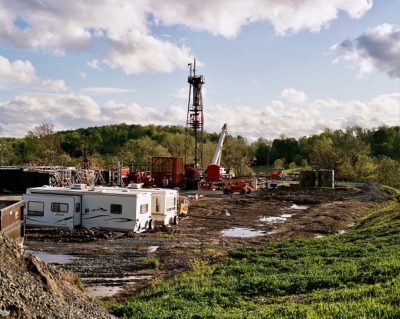 Hydraulic fracking does indeed pollute well water, a study of complaints made to state regulators indicates. The Associated Press surveyed complaints made to state authorities in Texas, West Virginia, Ohio and Pennsylvania and found a pattern that suggests fracking causes pollution.
Hydraulic fracking does indeed pollute well water, a study of complaints made to state regulators indicates. The Associated Press surveyed complaints made to state authorities in Texas, West Virginia, Ohio and Pennsylvania and found a pattern that suggests fracking causes pollution.
The AP uncovered hundreds of cases in which private water wells may have been contaminated by fracking. Worse, it found that regulators in some states tried to cover up the pollution by delaying access to public records. Reporters also discovered that many property owners were unaware of the complaints about fracking. The AP’s findings seem to verify conclusions made in a July article in Scientific American.
“In Pennsylvania, the closer you live to a well used to hydraulically fracture underground shale for natural gas, the more likely it is that your drinking water is contaminated with methane,” Mark Fischetti wrote. Fischetti was describing a study of well water in areas of the state where fracking for natural gas is common.
What the AP found
Some of the AP’s findings about fracking and well water included:
- The Pennsylvania Department of Environmental Protection (DEP) received 398 complaints about fracking and water pollution in 2013. That was down from 2012 when the agency received 499 complaints.
- The Ohio Department of Natural Resources received 37 complaints about fracking in 2010, 54 complaints in 2011, 59 complaints in 2012 and 40 complaints in the first 11 months of 2013.
- The Texas Railroad Commission has received 2,000 complaints about fracking and contamination in an unspecified time period.
Duke University professor Robert Jackson found methane contamination in 115 of 141 wells he surveyed in Pennsylvania. Wells within one mile of a fracking well had six times as much methane pollution as wells farther away, Jackson found.
Ultra Efficient Water Filter Fits In Your Pocket!
A 2011 study by Penn State University discovered that 40% of water wells in Pennsylvania violated federal standards for drinking water.
The amount of information contained in the complaints is not sufficient to make a scientific conclusion, Jackson told the AP, but he believes that the state should provide more details about fracking complaints to the public.
“Right or wrong, many people in the public feel like [the Pennsylvania] DEP is stonewalling some of these investigations,” Jackson said.
Industry tries to cover up fracking pollution
The lack of information about fracking complaints is fueling distrust in the oil and gas industry and fracking. Many people distrust both the industry and regulations.
“If the industry has nothing to hide, then they should be willing to let the facts speak for themselves,” Scott Anderson of the Environmental Defense Fund said. “The same goes for regulatory agencies.”
The oil and gas industry has gone to some lengths to keep information about fracking secret. A settlement between Stephanie and Chris Hallowich of Mount Pleasant, Pennsylvania, and drilling company Range Resources actually contained a gag order that prevented the Hallowich’s children from talking about fracking.
In a suit against Range Resources, the Hallowichs alleged that fracking had contaminated their well. The couple eventually settled with the company for $750,000 and a promise not to discuss their case in public.
EPA not likely to crack down on fracking
Analysts told Reuters that they don’t think that the EPA will go after drillers because of politics. Critics believe that the EPA is afraid of the politically powerful oil and natural gas industry.
Fracking is likely to increase because of rising demand for natural gas at home and abroad. The Japanese government is planning to replace nuclear power plants with natural gas burning turbines because of the Fukushima disaster.
The US Department of Energy has approved the export of natural gas. Chevron and the Apache Corporation have built a giant port for the export of natural gas in British Columbia. Similar ports are planned in the United States.
Sign up for Off The Grid News’ weekly email and stay informed about the issues important to you
 Off The Grid News Better Ideas For Off The Grid Living
Off The Grid News Better Ideas For Off The Grid Living




